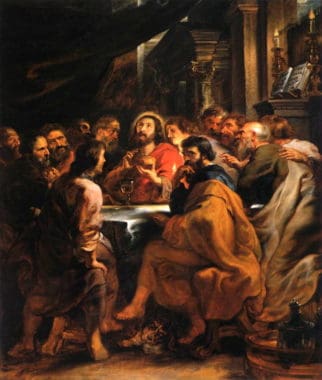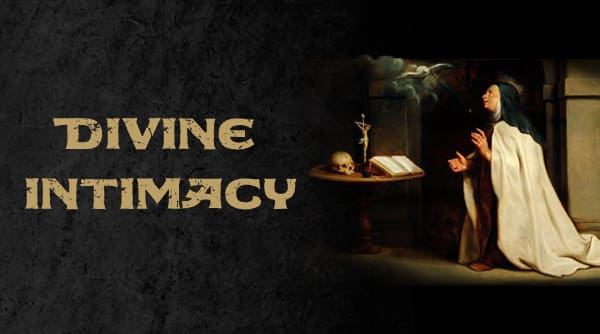Mystery of Hope
Presence of God – Let me hunger for You, O Bread of Angels, pledge of future glory.
MEDITATION
Jesus said: “I am the living bread which came down from heaven. If any man eat of this bread, he shall live forever, and the bread that I will give is My Flesh, for the life of the world.” The Jews disliked this speech; they began to question and dispute the Master’s words. But Jesus answered  them still more forcefully: “Amen, amen, I say unto you, except you eat the Flesh of the Son of man and drink His Blood, you shall not have life in you” (John 6:51-54). These are definitive words which leave no room for doubt; if we wish to live, we must eat the Bread of Life. Jesus came to bring to the world the supernatural life of grace; and this life was given to our souls in Baptism, the Sacrament which grafted us into Christ. Thus it is a gift of His plenitude, but we must nourish it by a deeper penetration into Christ. To enable us to do so, He Himself willed to give us His complete substance as the God-Man, making Himself the Bread of our supernatural life, the Bread of our union with Him. St. John Chrysostom says, “Many mothers entrust the children they have borne to others to nurse them, but Jesus does not do that. He feeds us with His own Blood and incorporates us into Himself completely.” Baptism is the Sacrament which engrafts us into Christ; the Eucharist is the Sacrament which nourishes Christ’s life in us and makes our union with Him always more intimate, or rather, it transforms us into Him. “If into melted wax other wax is poured, it naturally follows that they will be completely mixed with each other; similarly, he who receives the Lord’s Flesh and Blood is so united with Him that Christ dwells in him and he in Christ” (St. Cyril of Jerusalem).
them still more forcefully: “Amen, amen, I say unto you, except you eat the Flesh of the Son of man and drink His Blood, you shall not have life in you” (John 6:51-54). These are definitive words which leave no room for doubt; if we wish to live, we must eat the Bread of Life. Jesus came to bring to the world the supernatural life of grace; and this life was given to our souls in Baptism, the Sacrament which grafted us into Christ. Thus it is a gift of His plenitude, but we must nourish it by a deeper penetration into Christ. To enable us to do so, He Himself willed to give us His complete substance as the God-Man, making Himself the Bread of our supernatural life, the Bread of our union with Him. St. John Chrysostom says, “Many mothers entrust the children they have borne to others to nurse them, but Jesus does not do that. He feeds us with His own Blood and incorporates us into Himself completely.” Baptism is the Sacrament which engrafts us into Christ; the Eucharist is the Sacrament which nourishes Christ’s life in us and makes our union with Him always more intimate, or rather, it transforms us into Him. “If into melted wax other wax is poured, it naturally follows that they will be completely mixed with each other; similarly, he who receives the Lord’s Flesh and Blood is so united with Him that Christ dwells in him and he in Christ” (St. Cyril of Jerusalem).
COLLOQUY
“O heavenly Father, You gave us Your Son and sent Him into the world by an act of Your own will. And You, O my Jesus, did not want to leave the world by Your own will but wanted to remain with us for the greater joy of Your friends. This is why, O heavenly Father, You gave us this most divine Bread, the manna of the sacred humanity of Jesus, to be our perpetual food. Now we can have it whenever we wish so that if we die of hunger, it will be our own fault.
“O my soul, you will always find in the Blessed Sacrament, under whatever aspect you consider it, great consolation and delight, and once you have begun to relish it, there will be no trials, persecutions, and difficulties which you cannot easily endure.
“Let him who wills ask for ordinary bread. For my part, O eternal Father, I ask to be permitted to receive the heavenly Bread with such dispositions that, if I have not the happiness of contemplating Jesus with the eyes of my body, I may at least contemplate Him with the eyes of my soul. This is Bread which contains all sweetness and delight and sustains our life” (Teresa of Jesus [Teresa of Avila], Way of Perfection, 34).
“All graces are contained in You, O Jesus in the Eucharist, our celestial Food! What more can a soul wish when it has within itself the One who contains everything? If I wish for charity, then I have within me Him who is perfect charity, I possess the perfection of charity. The same is true of faith, hope, purity, patience, humility, and meekness, for You form all virtues in our soul, O Christ, when You give us the grace of this Food. What more can I want or desire, if all the virtues, graces, and gifts for which I long, are found in You, O Lord, who are as truly present under the sacramental species as You are in heaven, at the right hand of the Father? Because I have and possess this great wonder, I do not long for, want, or desire, any other!” (St. Mary Magdalen dei Pazzi).
+
 Note from Dan: This post on the mystery of hope is provided courtesy of Baronius Press and contain one of two meditations for the day. If you would like to get the full meditation from one of the best daily meditation works ever compiled, you can learn more here: Divine Intimacy. Please honor those who support us by purchasing and promoting their products.
Note from Dan: This post on the mystery of hope is provided courtesy of Baronius Press and contain one of two meditations for the day. If you would like to get the full meditation from one of the best daily meditation works ever compiled, you can learn more here: Divine Intimacy. Please honor those who support us by purchasing and promoting their products.
Art for this post on the mystery of hope: Last Supper, Peter Paul Rubens, between 1631 and 1632, PD-US author’s life plus 100 years or less, Wikimedia Commons. Father Gabriel of St. Mary Magdalen, mirror from open source material.




